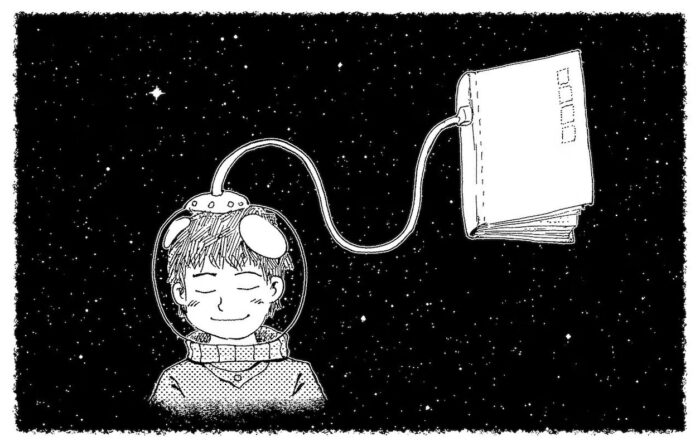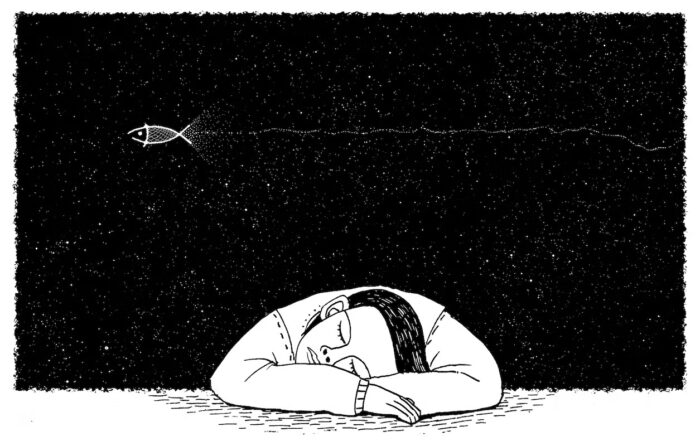Non-REM, REM, Sleep Cycle – What Does It Mean?
Every time you fall asleep, your body undergoes certain changes that form one sleep cycle. Each sleep cycle is divided into several stages of varying lengths, during which the body relaxes, recovers, and replenishes its energy for the following day. The REM sleep phase happens at the end and is one of the most fascinating displays of our brain activity.
To remind you, these are the stages of a sleep cycle:
Non-REM Sleep
- Stage 1 involves light sleep. This is the time between wakefulness and transitioning into a deeper sleep. You know the sensation: you’re not quite asleep, so you hear your flatmate sneaking into the kitchen for a late-night snack (probably the last of the Oreos you had your eyes on), but you’re also not quite awake to do anything about it. Usually, the first stage doesn’t last longer than ten minutes, and it’s easy to wake up at small disturbances. This is also when your muscles sometimes jerk – it’s because there’s some pent-up tension in them, which is released in a so-called hypnic jerk.
- Stage 2 prepares your body for deep sleep. Your muscles alternate between tone and relaxation, the brainwaves slow down, and the eyes stop moving. Sometimes, sleep spindles occur – these are somewhat peculiar brainwave frequencies associated with learning and controlling sensory functions. Although they show on an EEG scan (electroencephalography), they do not manifest physically, and so far, science has not given us all the answers about why they happen.
- Stages 3 and 4 are deep sleep phases. This is the longest stage of non-REM sleep, and your body takes it as the best chance to fully relax. Your body temperature drops, your eyes and muscles stop moving, and sometimes you even get attacked by sleep-paralysis demons. The deep sleep stage is responsible for waking up refreshed, although there are indications that this is when the brain clears up memory paths to foster better memorisation of what happened the previous day.
What Happens in the REM Sleep Phase?
Rapid eye movement sleep is the final stage of the sleep cycle. It can happen in several subsequent instances, with the first lasting several minutes and the others getting progressively longer. REM sleep comprises about 20-25% of your sleep cycle. During this phase, your muscle tone stays low while brain activity increases. Your heart also beats faster (and sometimes irregularly), and most commonly you experience dreams. While dreams can happen in non-REM sleep, too, they are most vivid and memorable at this time. REM sleep is also associated with memory consolidation (which shows WHY getting a good night’s sleep before your exams is important!).
While the brain shows the degree of activity parallel to wakefulness, the body remains still during the REM phase. Some theories suggest that this happens so that we won’t hurt ourselves by trying to act out our dreams, but in recent years, the theory has lost steam. The question of muscle tone remained, as did all the questions about how and why dreams happen.

REM Sleep Importance (and Dreams!)
As you know, dreams are a series of images, sounds, and emotions that occur while you sleep. REM sleep dreams tend to be more memorable and often weird as your brain processes past events and emotions. Over the years, many have tried to interpret dreams, but there is no evidence to suggest that any of the common symbols mean anything (e.g. if you dream of the phone ringing, you’ll hear bad news).
What we do know is the following:
- You cannot control dreams – they just happen.
- Dreaming happens in the first-person perspective.
- Some people dream in colour, others in black and white. Blind people are more likely to dream of sounds and sensations than images.
- Dreams do not invent. Everything you see is a combination of something you know from waking life, even though elements may be put together in the most bizarre ways.
- Dreams are affected by the stress hormone cortisol, which changes during the night – thus, different dreams happen in different stages.
Despite all the attempts to figure out dream symbolism, one is certain: dreams help process and regulate emotions from waking life. Sometimes, dreams replay recent events (this too can be warped) in order to analyse them, consolidate memory, and ditch superfluous information.
With dreams being a way of processing emotions, it is silly to say they don’t mean anything, but the key to unlocking them lies only in your brain and heart. For example, if you dream of fighting with someone, this doesn’t mean you’re going to argue with them in real life, but it may have to do with how this person makes you feel or events that they remind you of. On the other hand, they may mask some of your unprocessed emotions, which is why it’s best just to let your brain sort these out and not try to overthink them.
Can Dreams Predict the Future?
Every now and then you hear stories about people’s dreams predicting the future. While some dreams have come true (e.g. Lincoln’s assassination), there is no scientific evidence to suggest there are such things as psychic dreams.
The exception may be found in dreams relating to mental decline. For example, early signs of Parkinson’s disease can manifest as nightmares about cognitive decline. However, not every such dream needs to mean anything. People with high intuition sometimes may have dreams with specific details that can open some premonition-like ambiguity, but to this day, no data exists that would confirm the phenomenon.
In other words, even if you dream of someone dying, don’t worry; it’s not going to happen.
Tips for Improving REM Sleep (and Sleep in General)
It is difficult to gauge how bad it is to miss out on REM sleep specifically, as such disruptions usually come together with overall sleep disturbances. However, it is well-known that sleep deprivation causes trouble concentrating (so, don’t study the night before an exam), impinges on creating new cells, and reduces your ability to remember. In other words, you should take care of your sleep hygiene.
If you’re looking for ways to increase your REM sleep, you’re playing with a strange type of sleep equation. To get more REM sleep, you must increase your overall sleep time. Increasing and improving your sleep often go hand in hand, which is why you should develop healthy habits around your sleep patterns.
Follow these tips to boost your sleep:
- Sleep at night. I’m sorry if you’re one of those night owls who prefer to sleep during the day, but following the circadian rhythm is the best way to get the most out of your sleep. Not only does this help you get the best rest, but it also regulates your heart function, controls weight, and improves your quality of life.
- Have a bedtime routine. Develop and enforce a sleep schedule – aim to be in bed by 11pm most nights. Stay away from your phone before bedtime and focus on doing something that relaxes you.
- Get some exercise. Busting a move for about 30 minutes a day is a good way to balance your hormones and sleep patterns.
- Work on your stress levels. If you’re too worked up during the day, you may find yourself unable to sleep because you’re still stressed out (or better yet, thinking of all the good comebacks you should have used in an argument). Instead of suffering from hindsight cleverness, develop a set of coping strategies like taking a walk or doing some yoga.
- Keep your bedroom cool, dark, and quiet.
- Avoid caffeine and alcohol before bed. For coffee-drinkers out there, you must stop drinking coffee some 6-7 hours before bed. I know this is not possible for everyone, but at least try to avoid it after 6pm.
If you have trouble falling asleep, it is better to get up and do something in another room than to toss and turn for hours. Also, if you experience regular sleep disturbances, you should talk to your doctor, as there may be an underlying issue preventing you from getting the ZZZs.

Better REM Sleep = Better Quality of Life
To recap, REM, or rapid eye movement, sleep is the final phase of a sleep cycle. During this stage, your brain activity and heart rate increase while the body remains relatively still. REM sleep is particularly important for processing events and memories and boosting working memory. Early signs of not getting enough sleep usually include lack of concentration, inability to make decisions, and poor information retention. In other words – you can’t ace your exams if you’re not getting enough sleep!
Improve your sleep to improve your life with these tips:
- Develop a bedtime routine.
- Sleep in a cool and dark room.
- Sleep at night – avoid staying up every day.
- Aim for eight hours of sleep.
- Lead a healthy life during the day – exercise, good nutrition, and decent stress-management strategies.
Good night!












